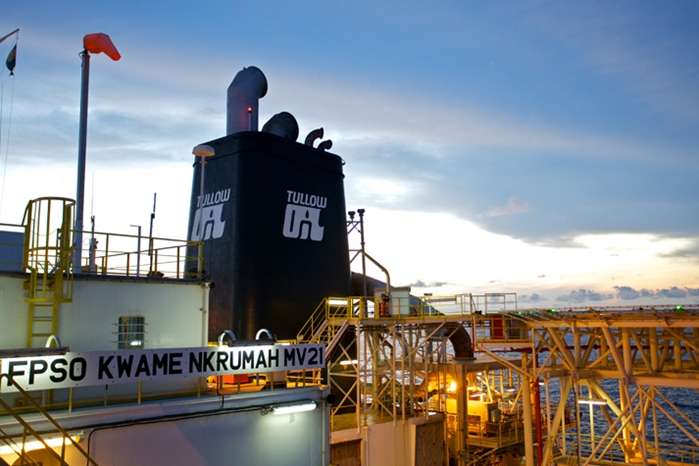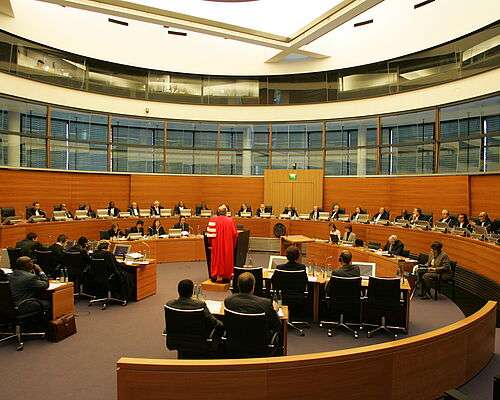Since the first discovery of oil in 2007, Ghana’s upstream oil and gas industry has enjoyed relatively stable growth. While this is commendable, the sector has not been without major challenges that appeared to have rocked the boat, and could have sent the sector on a downward spiral.
Overcoming the odds, Ghana is heralded among one of the giants within Africa’s oil and gas industry, despite the relatively low output capacity compared to that of other regional oil-producing countries. Historically, the sector’s regulatory and governance frameworks have positioned the country as a force to be reckoned with.
Ghana’s petroleum industry catches the eye of other young oil producing countries, and most recently Guyana happens to be the country’s new found ally and strategic partner with plans advanced to see both countries benefit mutually from various agreements that were inked in the past year.
President of the Co-operative Republic of Guyana, H.E. Mohammed Irfaan Ali, on December 5, 2021 said: “We are very excited about this strategic partnership; it is receiving attention from the highest levels of government.
“This is a sign of concrete progress, and we will continue to engage and agree on practical steps and develop policies for the mutual benefit of our two countries.”
H.E. Mohammed Irfaan Ali , President, Republic of Guyana
However, the country has come this far with major ‘scars’ including: Kosmos Energy’s Corruption Scandal, the Ghana-Côte d’Ivoire maritime dispute and the ongoing Eni-Springfield unitisation impasse.
Kosmos Energy Endures Under ‘Political’ Hot Waters
Among the first entrants into Ghana’s petroleum industry, after the discovery of the Jubilee field in 2007, Kosmos Energy had its own share of challenges within the petroleum industry.
In 2008, after the famous elections that took the then NPP government out of power for the next 8 years, the change in government from the NPP to NDC led to corruption investigations into Kosmos’s entry to Ghana through its relationship with the EO Group, a Ghanaian petroleum company.
Both the Ghanaian government and the US Department of Justice were involved in the criminal investigations. The EO Group, founded by two Ghanaian nationals, contacted Kosmos and proposed exploration in Ghana’s offshore waters. As such, the EO Group initiated Kosmos’s entrance into Ghana and directed its attention to the Cape Three Point block in the Western Basin.
Per Kosmos’ agreement with EO Group, it was to give EO Group a 3.5 per cent stake in the Jubilee field in return. Kosmos also intended to cover the initial cost for the EO Group to participate in exploration and development.
According to sources, the individuals in the EO Group had close political connections with the NPP government and mediated the relationship with Kosmos. Due to their political affiliations with the then government, Kosmos courted a good relationship with the government and as such took a huge risk with regards to the political party system.
Obviously, the transition in government and the high stakes in the new petroleum industry created unexpected problems for Kosmos.
In addition to misuse of political connections, accusations of forging signatures and documents were also unearthed. Police investigations into the issue led to a government order to the Bank of Ghana to freeze accounts of Kosmos and affiliated individuals.
The change of government indirectly meant that political intervention was to be expected in Ghana. However, international recognition of the issue gave the investigations further momentum.
In October 2009, Anadarko filed a complaint about Kosmos’s compliance under the Foreign Corrupt Practices Act at the US Department of Justice for possible violations in connection with securing licensing, exploration, and production agreements. Anadarko had been working with Kosmos since the start of developing the Jubilee field.

Due to the intricacies surrounding the issue, Kosmos confirmed plans to sell its stake in the Jubilee field, worth an estimated US$4 billion, to ExxonMobil. GNPC had previously expressed interest in Kosmos’s Jubilee shares in 2009.
However, with no proposal forwarded by the GNPC, Kosmos went ahead with negotiations with ExxonMobil. The government of Ghana announced that it would not approve Kosmos’s sale of the Jubilee shares.
In August 2010, Kosmos stated that they would not sell their Jubilee shares to ExxonMobil or anyone else and instead would continue with offshore exploration and development with the Jubilee partners.
In December 2010, the Ghanaian government and Kosmos signed a truce agreement. The US Department of Justice stated in April 2011 that it would not take action in regards to Kosmos and the EO Group.
Party-political polarization has been common in Ghana between the two political parties and this has continued among several contracts in the oil and gas industry as well as the energy industry. The two political parties constantly accuse each other of corruption, review contracts, and in some cases prosecute individuals that they find have engaged in corrupt practices.
In this new era of energy transition, as there is growing need for investments into the country’s upstream oil and gas industry, change in governments will continue to spark probes and scrutiny into petroleum contracts to ascertain whether or not corruption has taken place.
Maritime Border Dispute: Ghana and Côte d’Ivoire
The maritime border dispute between Ghana and Côte d’Ivoire resulted from a long-term disagreement regarding the direction of the azimuth line dividing the two countries’ territorial waters, exclusive economic zones, and portions of the continental shelf.
The TEN fields, developed by Tullow Oil Ghana, are located in Ghana’s Western Basin on the border with Côte d’Ivoire— an area that Côte d’Ivoire in September 2011 claimed as part of its exclusive economic zone.
After a series of bilateral negotiations that did not yield meaningful results, Ghana turned to the International Tribunal of the Law of the Sea (ITLOS) in November 2014 to ask the tribunal to determine the precise geographical coordinates of the maritime boundary between the two countries.
The government argued that there had always been a tacit agreement regarding the location and direction of the maritime boundary. As such, Ghana wanted ITLOS to affirm the customary equidistance boundary as the two countries’ maritime border.
Meanwhile, Côte d’Ivoire maintained that the maritime boundary between the two countries was still to be delimited, as there had been no formal or tacit agreement on it. Côte d’Ivoire argued that there had only been four drilling operations in the disputed area, to which Côte d’Ivoire had made clear objections.

The tribunal made an interim ruling in April 2015 that Tullow and Ghana could continue to develop the TEN fields, under the condition that no new wells would be drilled in the disputed area.
In its final judgment on September 23, 2017, the tribunal rejected Ghana’s claim that there had been a tacit agreement or estoppel regarding the two countries that constituted the delimitation of the maritime border.
However, it ruled that the single maritime border between the two countries started at the landmark BP 55+. The border that the tribunal determined placed the TEN fields on the Ghanaian side. Therefore, the tribunal found that Ghana did not violate Côte d’Ivoire’s exclusive sovereign rights and that the TEN fields were in Ghana’s exclusive economic zone.
While the 3-year-long border dispute at ITLOS was eventually resolved in Ghana’s favour, it demonstrates the initial rush of development in the industry for both the Jubilee and TEN fields and also adequately showed the country’s preparedness and the handicap in technical expertise of the involving institutions in Ghana.
Obviously, if the verdict had gone in the favour of Côte d’Ivoire, the financial losses to both Ghana and Tullow would have been severe. This presents a typical case which requires the government to ensure the ongoing Ghana-Togo maritime disputes are settled amicably.
In fact, this would not have been warranted if immediately after this judgment, the government moved to officially demarcate its oil and gas explorations occurring at its Togo border.
Eni-Springfield Unitisation Impasse
Despite having been awarded exploration and production license on the Tano Basin offshore block in July 2019, ENI and its partner Vitol have had to tussle with Springfield and the Ministry of Energy on the proposed unitisation since 2020.
It all began in April 2020, when the then Minister of Energy, Mr John Peter Amewu, in accordance with Section 34(1) of the Petroleum (Exploration and Production) Act, 2016 (Act 919), directed ENI and Springfield to execute a unitization with respect to the Sankofa field in the OCTP and Afina discovery in the WCTP contract areas.
In early 2021, Springfield, in its first move over the matter, took Eni to court, which ended with the ruling going in favour of Springfield. The court awarded Springfield a 30% share of revenues from Eni and Vitol’s Sankofa field. The payment amounted to approximately $40million per month which was expected to be directed to an account agreed by both parties.
In August 2021, the Court of Appeal (civil division), dismissed an application by Eni and Vitol for stay of execution of a High Court ruling in the ongoing unitization legal tussle between the two companies and Springfield Exploration.
In what seemed a disturbing turn of events, Eni made a second attempt to appeal the court’s ruling as it also filed a case in an Accra High court in October 2021 against Springfield and the Attorney General to set aside the unitisation directive, as illegal and void. However, the application was dismissed as the court ruled that the unitisation directive was legal.

The President of Ghana, H.E. Akufo Addo, indicated the government’s interest to ensure these negotiations do not escalate further, and that an amicable solution is found in the near term, however, the unitisation deadlock continues to drag.
The Institute for Energy Security (IES) has indicated that the government risks losing US$8.4 billion in revenue, in case the proposed unitization of the Afina and Sankofa fields does not happen.
However, the government will be the biggest loser should this unitisation impasse turn out sour; in the scenario where Eni relinquishes its operations in the country.
Indeed, these three major challenges that have rocked the country’s upstream petroleum sector present valuable lessons which the country should learn from and avoid repeating them.
Already, the risks within the sector are growing due to the ongoing energy transition. Some of these issues herein highlighted give a vivid picture of the strength of the sector. Therefore, any gaps identified in these three major issues should be looked into, to further strengthen the sector to withstand the shocks ahead.
READ ALSO: Road Traffic Regulations: We Need Enforcement- NRSA PRO



















